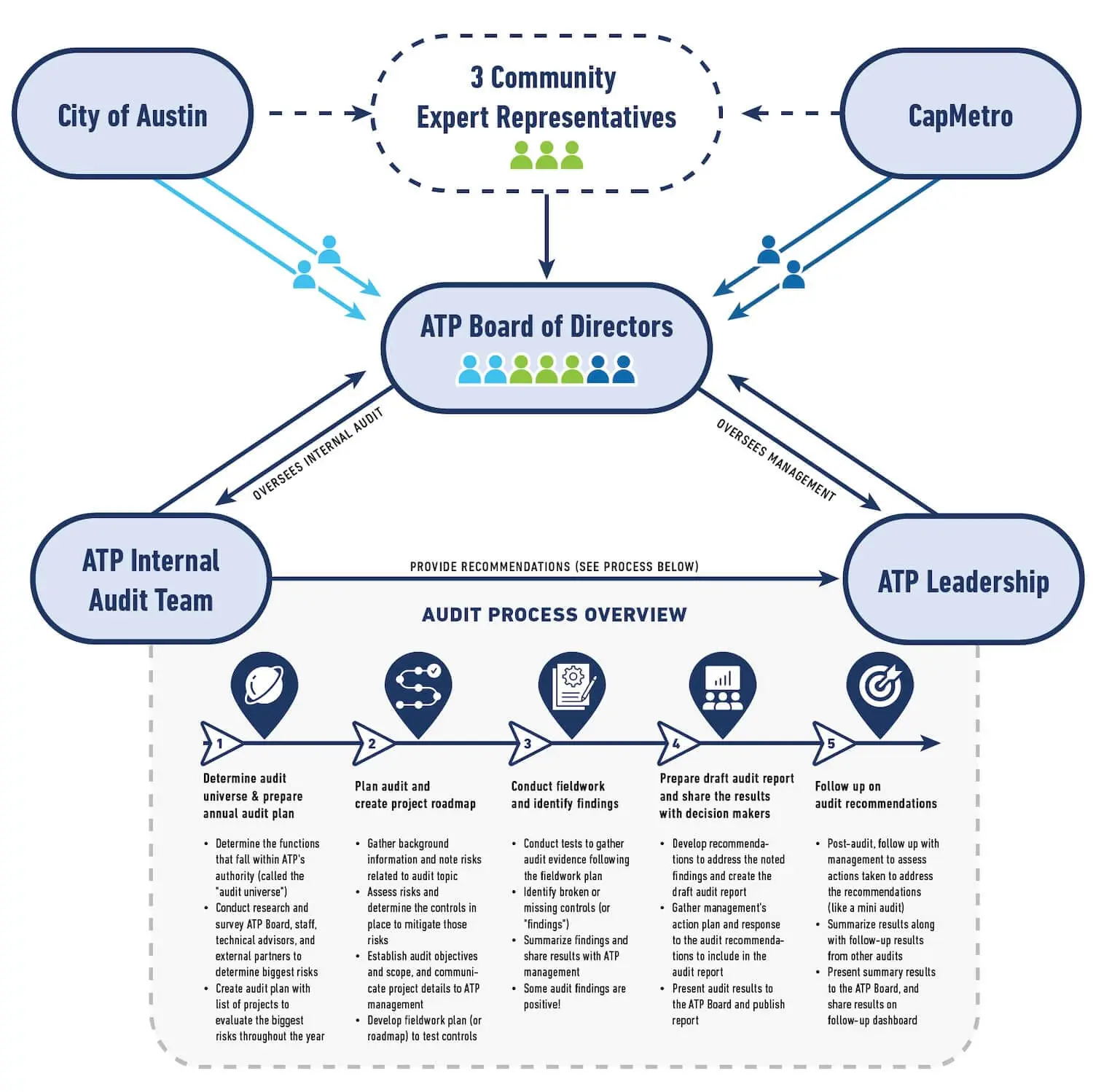The mission of Internal Audit is to help improve ATP’s governance, control, and risk management by conducting independent audit and advisory service projects. Internal Audit reports directly to the ATP Board and is independent of the administration of ATP. This allows us to more objectively evaluate how well ATP is delivering on its charge to carry out the voters’ transit vision in partnership with the community.
What do auditors do?
Internal audit primarily conducts three types of projects: audit projects, advisory projects and follow-up projects. Separate from these, Internal Audit oversees ATP’s ethics hotline and conducts related ethics investigations as needed.
Give Your Input
Do you have ideas about what ATP can do to make Project Connect more successful or how ATP can improve? Share your thoughts with us.

Audit Plans
At the start of ATP’s fiscal year, Internal Audit shares the plan for what we intend to audit in the upcoming year. The Internal Audit Plan notifies the public, the Board and management which aspects of ATP’s governance, control and risk management our work will address in the upcoming year. Projects in this plan include audit and advisory services conducted by Internal Audit, and projects outsourced to external assurance providers.
Audit Recommendations Interactive Dashboard
Beginning with the Audit Plan, Internal Audit prepares for and conducts projects that often result in findings and recommendations to ATP management. Post-audit, Internal Audit follows up to assess the results of actions taken.
The recommendations dashboard below shows the current Status of issued recommendations. Statuses include management has Started implementing the recommendation, the recommendation is fully Implemented, or the recommendation is No Longer Relevant. ATP management provides regular updates on their actions for each recommendation, which is included in the Last Update column of the table.
Ethics Report
If you have a concern about misconduct, suspected fraud, waste, abuse, or a violation of ATP policies, or if you fear retaliation relating to an ethical matter, ATP provides simple and anonymous ways to voice your concerns. File your report via the portal below, or call 888-57-ATPTX for assistance.
Frequently Asked Questions About Internal Audit
What does Internal Audit do?
Internal auditing helps an organization accomplish objectives by evaluating and improving the effectiveness of risk management, control, and governance processes. An effective, independent Internal Audit function can increase a government’s credibility with the public, oversight agencies, granting authorities, and bond markets.
In a nutshell, we evaluate ATP to see if there are ways to make us operate more effectively and efficiently. If we identify process improvement opportunities, we make recommendations on how to improve ATP to management, and ATP management then decides whether they agree or disagree with those recommendations. When they agree, they formulate an action plan on how they’ll make those improvements and then auditors will follow up on those actions plans periodically in future years. When ATP management and auditors work together, we are more accountable to taxpayers and ultimately, we are better able to serve the City.
Internal audit primarily conducts three types of projects.
- An audit project is designed to objectively assess an element of ATP’s operation to provide an opinion or overall conclusion about the audited subject and provide recommendations for improvement.
- An advisory project is generally performed at the request of the intended recipient of the advisory service and is a consulting project to provide high-level suggestions on ways to improve ATP.
- A follow-up project is a more narrowly scoped audit project designed to determine if corrective actions have been taken to address previously issued audit recommendations.
Internal Audit also oversees ATP’s ethics hotline and conducts related ethics investigations as needed.
